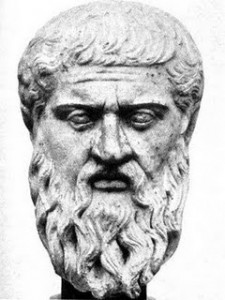Why did Justinian close the Platonic Academy?
 The closing down of the schools in Athens is often held up as the symbolic moment when the traditions of the classical world finally ended. It’s usually portrayed as the triumph of Christian intolerance over the cool-headed spirit of antiquity, a rising tide of anti-intellectualism that snuffed out the last vestiges of the Greco-Roman tradition. The leading actor in the saga- Justinian- is revealed to be a zealot and a boor, all too typical of the unfolding medieval age.
The closing down of the schools in Athens is often held up as the symbolic moment when the traditions of the classical world finally ended. It’s usually portrayed as the triumph of Christian intolerance over the cool-headed spirit of antiquity, a rising tide of anti-intellectualism that snuffed out the last vestiges of the Greco-Roman tradition. The leading actor in the saga- Justinian- is revealed to be a zealot and a boor, all too typical of the unfolding medieval age.
Unfortunately for Gibbon (and others who hold this view), it doesn’t stand up to any kind of scrutiny. The idea of the Church being anti-intellectual is silly enough (if you enjoy reading Aristotle, Homer, or the other pagan authors of antiquity you can thank your local Byzantine monk) As for Justinian, by the standards of the day he wasn’t particularly fanatical- quite the opposite. He married a heretic (Theodora was Monophysite), and employed pagans- the most famous being John the Cappadocian. There were the standard edicts ‘forbidding’ paganism but the emperor was blatantly violating that himself and there is no evidence that they were strictly enforced elsewhere. Athens’ most famous landmark- the Parthenon- was probably still a pagan temple for the duration of Justinian’s reign.
So if he didn’t have an axe to grind against paganism why did Justinian close the Academy in 529?
Competition. He had just founded a new University in Constantinople which was directly under imperial control, and this was a convenient way to get rid of a rival. He did the same thing to the main competitor of his new law school. When an earthquake hit the renowned university of Beirut in 551 he took the opportunity to close it down (officially it was ‘moved’ but it never recovered) while transferring its most distinguished faculty to the capital.
Ruthless? Yes. Anti-intellectual religious fanaticism? Not quite.
I think that this may be a good beginning to break from the age of classicism…….I never thought of this, but now it makes sense. I just assumed the end of the classical world ended perhaps when Romanalus Augustus was hiding under the table and crying…..Classics went out w/ a whimper……unfortunately. Now this is a great place better w/ Justinian…..it is like gradually Classicism died !! I like this better.
Of course some elements of the classical tradition continued unbroken right to 1453, but like any living thing classical Rome gradually morphed into medieval Byzantium. Clean breaks can be somewhat rare in history- only looking back at the distance of centuries was it possible to see that something new had emerged.
[…] Finding History » Why did Justinian close the Platonic Academy? […]
[…] Finding History » Why did Justinian close the Platonic Academy?Jul 12, 2011 … Justinians crown | Bestdealsevero. on 26 Jul 2011 at 4:19 am. […] Finding History » Why did Justinian close the Platonic Academy? […] … […]
John wasn’t a pagan that was Procopius in his Persian Wars that wrote that John might have been a secret pagan. About 20 years ago, a tax rescript was found that had John’s names Flavius Mariaus Gabriealius Michaelius Johnannes Eutropius it involved the city of Justininpolis-shifting there tax burden to Miletus of 61 gold pieces, John and the other Pretorian Perfects werre involved in the process as well as Justinian. This is info was published around 2005. So, John wasn’t a pagan, probably a christian since the Steliae was from that period around April 533 and include his various christian names. Now, Triborian another official of Justinian might have been a pagan. See Roman Inscriptions from 2001 to 2005 under your google serach about John.
Well, Gibbon view of Justinian was shaped by Procopius and Evagrius and so forth, a lot of comtempoary sources that disliked Justinian. Procopius is the one that stated in Secret History Justinian would killed people that disagree with him on the nature of Christ. So, its the Byzantine sources themselves that also had an influence on Justinian.
Thanks for the catch Cynthia- it was Tribonian who was the pagan not John. As far as Justinian’s ruthlessness, I do think it takes a certain kind of harshness to order the indiscriminate slaying of a rioting population in the Hippodrome. But that being said, I don’t think he was ruthless without a purpose. Rather I get the sense that he was probably more mild than his wife and was ‘forced’ to take a harder line than he naturally would have. Having been raised from a lower station then her husband, Theodora was a more zealous guard of the imperial dignity- hence his desire want to pardon Hypatius countermanded by her words.
Justinian closed the *neo*platonic academy, which then shifted to Persia, where it was given sanctuary from persecution. It *is* anti-intellectual to drive scholars into exile. Setting up another academy elsewhere is no excuse. Why didn’t the scholars from Athens move to Justinian’s university? They were obviously not welcome there.